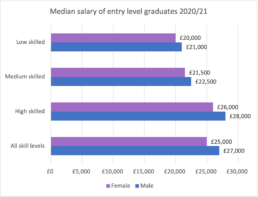Young women trying to climb onto the career ladder are being left hanging below their male graduate peers, according to latest figures from HESA, the Higher Education Statistics Agency.
Researchers found that young men starting their first job after university are being paid eight percent more than young women at the same stage.
The data shows that starting salaries for young women have been static over the past year, while young men’s have steadily risen. This is worrying: not only are starting salaries for younger women failing to keep pace with soaring inflation, but importantly it shows the gender pay gap kicking in from the outset. It’s all the more surprising in the light of a buyer’s market for jobseekers in many high skilled sectors.

Outlining the findings, HESA highlighted how:
-
- when considering all skill levels combined, male full-time, first degree graduates in full-time paid employment in the UK have a greater median salary than females. The median salary of females has remained the same as last year, whereas the median salary of male graduates has increased from £25,000 to £27,000.
- when considering skill level, the pay gap between male and female graduates at the time of the 2020/21 survey was greatest among those in high skilled employment.
These are depressing statistics and underline how gender pay disparity starts and then persists. Unfair outcomes from the start, with young women being devalued by employers, demands action. Younger women need to be coached to push for parity in bargaining terms and transparency on salaries can help this.
Read the statistics and report overview here.
Author

Maggie Taylor
Founder of Lumin, creating opportunities for women solopreneurs to collaborate, grow, and build successful businesses, fuelled by shared knowledge, mentorship, and real partnerships across generations
Related Posts
tackling the gender wealth gap
The gender pay gap is widely discussed, but its ripple effects extend into a…
06/12/2024gender wealth gap,NoBa Capital,women investors,women mentoring women,Lumin Community,women change makers,life,finances,mission,gender pay gapgender pension gap,Vanesa Pazos,EmpowerHer
why women work for free
Equal Pay Day 2024 will be 20th November – the day when far too many women will…
14/11/2024business,finances,missiongender pay gap,Fawcett Society,Equal Pay Day,financial inequality
first woman chancellor fails to move dial for women in work
This week’s budget from Rachel Reeves was disappointing from a female…
01/11/2024gender pay gap,Rachel Reeves,Autumn Statement,Labour,Chancellor,Budget,gender pension gap,LUMIN,financesmission,entrepreneurs,childcare,business funding,careers



